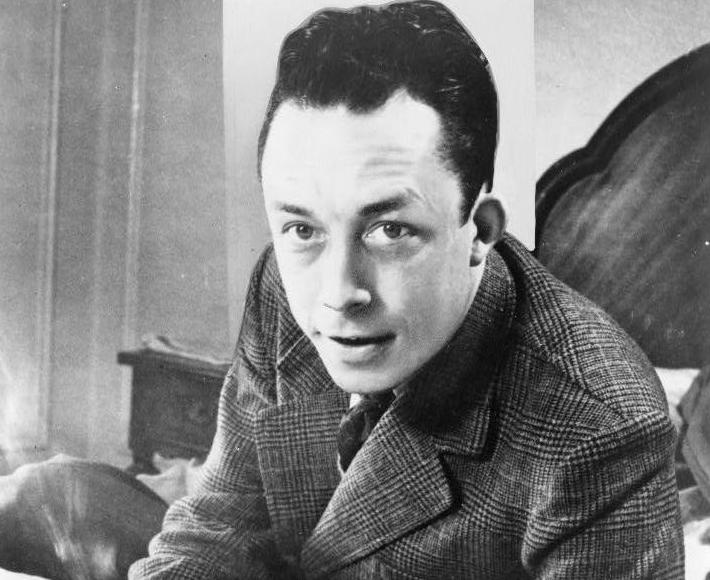
Literary statements about the nature and purpose of art constitute a genre unto themselves, the ars poetica, an antique form going back at least as far as Roman poet Horace. The 19th century poles of the debate are sometimes represented by the dueling notions of Percy Shelley — who claimed that poets are the “unacknowledged legislators of the world” — and Oscar Wilde, who famously proclaimed, “all art is quite useless.” These two statements conveniently describe a conflict between art that involves itself in the struggles of the world, and art that is involved only with itself.
In the mid-twentieth century, Albert Camus put the question somewhat differently in a 1957 speech entitled “Create Dangerously.”
Of what could art speak, indeed? If it adapts itself to what the majority of our society wants, art will be a meaningless recreation. If it blindly rejects that society, if the artist makes up his mind to take refuge in his dream, art will express nothing but a negation.
And yet, grandiose ideas about the artist’s role seemed absurd in the mid-twentieth century, when the question becomes whether artists should exist at all. “Such amazing optimism seems dead today,” writes Camus. “In most cases the artist is ashamed of himself and his privileges, if he has any. He must first of all answer the question he has put to himself: is art a deceptive luxury?”
Women artists have also had to consider the question, of course. Brain Pickings’ Maria Popova quotes Audre Lorde’s call for artists to “uphold their responsibility toward ‘the transformation of silence into language and action.” Ursula Le Guin believed that art expanded the imagination, and thus the possibilities for human freedom. Both of these writers were politically engaged artists, and so it’s little wonder that we find similar sentiments in Camus’ speech from decades earlier.
To make art, Camus writes, is to make choices. Artists are already involved, as Shelley declared, in shaping the world around them, whether they acknowledge it or not:
Reality cannot be reproduced without exercising a selection… The only thing needed, then, is to find a principle of choice that will give shape to the world. And such a principle is found, not in the reality we know, but in the reality that will be — in short, the future. In order to reproduce properly what is, one must depict also what will be.
The most eloquent, enduring expressions of future thinking are that which we call art. Even art that seeks to depict the fleetingness of nature freezes itself for posterity.
Art, in a sense, is a revolt against everything fleeting and unfinished in the world. Consequently, its only aim is to give another form to a reality that it is nevertheless forced to preserve as the source of its emotion. In this regard, we are all realistic and no one is. Art is neither complete rejection nor complete acceptance of what is. It is simultaneously rejection and acceptance, and this is why it must be a perpetually renewed wrenching apart.
To understand art as purposelessly divorced from the world is to misunderstand it, Camus argues. This is the misunderstanding of “a fashionable society in which all troubles [are] money troubles and all worries [are] sentimental worries” — the self-satisfied bourgeois society “about which Oscar Wilde, thinking of himself before he knew prison, said that the greatest of all vices was superficiality.”
Art for art’s sake is the doctrine of a “society of merchants… the artificial art of a factitious and self-absorbed society,” Camus declared. “The logical result of such a theory is the art of little cliques.” Or, to a degree Camus could not have imagined, we have the entertainment industrial complex of art for commerce’s sake, which in the 21st century can make it nearly impossible for art to thrive. (As actor Stellan Skarsgård recently said in public comments, the problem with the film industry is “that we have for decades believed that the market should rule everything.”)
Therefore, the question before Camus, and no less before artists today, is how to “create dangerously” in a society “that forgives nothing.” The question of whether or not art serves a purpose is a false one, he suggests, since “every publication is a deliberate act,” and therefore purposeful. The real question, for Camus the philosopher, “is simply to know — given the strict controls of countless ideologies (so many cults, such solitude!) — how the enigmatic freedom of creation remains possible.” If only arriving at such knowledge were so simple. Camus’ lecture has recently been translated by Sandra Smith and published in the short volume, Create Dangerously: The Power and Responsibility of the Artist. You can read a section of the lecture at Lithub.
Camus’ speech was presented on December 14, 1957 at the University of Uppsala in Sweden, shortly after he won the Nobel Prize.
via Brain Pickings
Related Content:
Hear Albert Camus Deliver His Nobel Prize Acceptance Speech (1957)
See Albert Camus’ Historic Lecture, “The Human Crisis,” Performed by Actor Viggo Mortensen
Josh Jones is a writer and musician based in Durham, NC. Follow him at @jdmagness


Leave a Reply